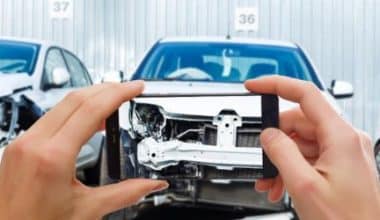Can you insure a car in California that is not in your name? It may be hard to insure a car that is not in your name, but many companies, like GEICO and State Farm, will let you as long as you can show that you have an insurable interest in the car. There are different ways to insure a car not in your name, depending on your needs. You can add the owner of the vehicle as an additional interest, join their policy, transfer the vehicle’s registration or join it, or purchase a non-owner policy.
Can You Insure a Car Not in Your Name?
You will need to provide evidence of an insurable interest when applying for auto insurance. Many times, this comes in the form of a pink slip, which is also known as a car title or registration. Showing insurable interest is a little harder when you do not have the car’s pink slip.
To be clear, the vehicle’s legal owner is responsible for maintaining insurance coverage if you borrow, lease, or are gifted the vehicle. But if you frequently borrow cars from others, you may want to look into a policy designed for people who do not own cars.
Can You Insure a Car Not in Your Name California?
Driving in every state, including California, requires car insurance before you can register your car, so it makes sense that the car in question is already covered. Your California driver’s license and insurance do not have to have the same name. Therefore, you can insure a car, not in your name, in California. There are some ways to insure a car, not in your name, in California. Lets look at them:
Ways to Insure a Car Not in Your Name In California
Although it might be tough to insure a car that is not in your name, you do have a few choices.
#1. Put the Car’s Owner on Your Insurance as an Additional Interest
Doing this can help you insure a car not in your name in California. By including a car owner as an additional interest on your insurance policy, you indicate to your insurer that you are the primary driver of another person’s vehicle. Since the owner of the car still has a stake in it even though they are not the primary driver, they are listed as an additional interest. Your car insurance does not cover the extra interest, but it ensures its protection.
The insurance company must see that you have a financial interest in the car owner before adding them to your policy. It tells auto insurers you have an incentive to maintain the vehicle. It is hard to prove your insurable interest in someone else’s car.
#2. Add Your Name to the Auto-Owners Insurance Policy
Adding you to their insurance should be simple if you live with the car’s owner. As a result, providers are more likely to insure family members who live in the same house. Adding a spouse or teenage driver to an existing auto insurance policy is a common practice. In California, when you add your name to the car insurance policy, it becomes easier to insure it if it is not in your name.
#3. Transfer or Add Yourself to the Vehicle Registration
Adding your name to the registration or transferring the registration into your name allows you to insure a vehicle that is currently registered to someone else. Some states do not permit this, even though it can help demonstrate your insurable interest in the car. If you frequently use the owner’s vehicle, this choice might be sensible.
If the owner does not need or want the car anymore, they can give you the registration so you can get insurance.
#4. Obtain a Co-Title
You might also be able to obtain insurance for the vehicle by adding your name to that of the registered owner. The cost of car insurance may go up even though getting a new title with a co-owner should make it simpler to insure a vehicle you do not fully own. Also, the car usually has to be paid off.
If more than one person owns a car, the order of their names on the title determines who can sell the car. You and the vehicle’s owner will probably need to apply for a new title together, though each state may have different requirements for this. Filling out the application, making a payment, and signing the title at the DMV are all necessary steps in this process.
#5. Buy a Non-Owner Insurance Policy
In California, you can insure a car not in your name by buying a non-owners policy. These types of insurance are called “non-owner insurance policies,” and they are made just for situations like this.
Drivers who frequently use a vehicle they do not own, such as those from a rental agency, a car-sharing service, or a friend or family member, can benefit from purchasing a non-owner insurance policy. If you do not currently own a vehicle and have a valid driver’s license, you may be eligible for this coverage. It allows you to maintain continuous insurance coverage, protecting you from a spike in premiums when you purchase your first car.
To protect yourself financially in the event of an accident, even if you do not own a car, you should consider purchasing liability insurance. It safeguards both you and the car’s owner, but it will not pay for repairs to the borrowed vehicle. Non-owner insurance policies provide very little in the way of coverage. This policy only provides liability protection, which is the bedrock of any insurance plan. Although it is sometimes possible to add personal injury protection to uninsured motorist insurance, that is usually all that is available.
Non-owner auto insurance is secondary, meaning it kicks in only if the primary policy’s limits are exhausted.
#6. Rely on permissive use
If the car’s owner has coverage, you will not need to purchase additional coverage if you only intend to use it occasionally. Permissive use is a feature of auto insurance that extends coverage to drivers who are not the vehicle’s registered owner but who are occasionally allowed to use the car.
If you borrow a car, ask the owner to put you down as a “permissive user” on their insurance policy. When borrowing for a one-time event, like running an errand or needing a ride to and from work, this protection can prove invaluable.
Make sure they have a current and valid driver’s license before letting them borrow your vehicle. Should an accident occur without one, your insurance may be voided. Check the driver’s record to make sure the person you are giving the car to is a safe driver.
Problems With Getting Car Insurance for a Car You Do Not Own
It can be challenging to obtain insurance for a vehicle that is not your own due to a lack of coverage options. Some of the difficulties you might encounter are listed below.
#1. Establishing a Need for Insurance
Insurable interest protects the main policyholder from losing money. It shows the company that insures your car that you value it and want to keep it in good shape. It will be harder to show that you have an insurable interest in the car if you do not own it. Many insurance companies might not want to cover you because they think you might be committing fraud.
#2. Filing Claims Can Be Hard
Expect a difficult claims process if the car is totaled in a major accident. There is a possibility that the owner will not receive compensation from the insurance company. The funds might go to you or the person who insured the vehicle instead.
#3. State Regulations
States have different regulations governing auto insurance. In some jurisdictions, the owner’s name on the registration and the policy must be the same. Insurance cards in the state of New York, for instance, must bear the same holder’s name as the vehicle’s registration.
Reasons Why You Should Keep Your Insurance Company Informed
Check with different insurance companies to see which ones will give you a policy for a car that is not yours. Your objective should be to make them understand that you have a financial interest in the car. To do so, you might explain that you depend on the vehicle to get to work or school.
Whatever the case, always tell your insurance company the truth. Being dishonest with your insurance company is against the law, and it could mean losing your policy and having trouble getting car insurance in the future. An insurance company works to lower risk, and someone who lies to them is seen as risky to insure. If your insurance company finds out you lied to them after an accident, you could have to pay for the damage yourself, and they could also cancel your policy.
Will Geico Insure a Car Not in My Name?
By establishing an insurable interest or paying an average of $311 annually for a non-owner policy, you can insure a car not registered in your name with GEICO. Although it is the vehicle owner’s responsibility to secure auto insurance, you may be able to insure and get coverage on a car not in your name through GEICO if you can demonstrate insurable interest. But it is hard to prove, and insurers typically only care if the car is your only means of transportation to and from work. Cars owned by members of one’s immediate family are often the easiest to prove one’s insurable interest in.
Find out from a GEICO insurance agent if you qualify to insure a car that is not registered in your name or get a non-owner policy. People who frequently borrow or rent cars but do not have a significant financial investment in them should consider non-owner car insurance.
Unless you live in New York, GEICO will sell you auto insurance as long as you can prove financial responsibility for the vehicle. The unfortunate reality for New York drivers is that the state mandates that insurance and registration must be in the same name.
What is GEICO Non-Owner Car Insurance?
Non-owner car insurance from GEICO is a form of liability insurance designed for frequent renters and family members who use a car that is not insured in their name. If the car’s owner also has another insurance policy on the vehicle, this one acts as supplemental coverage to help pay for medical bills and repair costs after an accident.
However, non-owner policies do not come with extra protection like collision or comprehensive insurance, so they are not as safe as standard policies. We advise enhancing your GEICO non-owner policy with helpful insurance choices like medical payments (MedPay) insurance or personal injury protection to receive more financial assistance following an accident. Like non-owner car insurance, these two types of coverage follow the driver instead of the car. This means that they will protect you if you drive a car that is not yours.
How Much Is Non-Owner Car Insurance?
Non-owners’ car insurance from GEICO costs about $311 annually on average. Non-owner policies are typically 10% less expensive than standard policies and do not have deductibles because they only cover liability. However, just like with standard auto insurance, the exact cost of a non-owner policy can change depending on risk factors like age, gender, location, and driving record.
To find the best non-owner auto insurance quote, compare GEICO’s to Allstate, Progressive, and State Farm.
How Does Non-owner Auto Insurance Work?
Liability coverage is the main purpose of non-owner car insurance. It follows that the owner’s policy takes precedence and that the non-owner policy will cover any outstanding debts.
In this case, let us say your non-owner policy covers $40,000 in property damage and the owner of the car covers $20,000 in property damage. When you drive that car, you cause an accident that costs $30,000. That is $10,000 more than the owner’s insurance covers. The first $20,000 is on the house owner’s insurance. Your non-owner policy will cover the extra $10,000.
You might face a $10,000 lawsuit if you do not have a non-owner policy.
You should get non-owner car insurance if you often rent or borrow a car or if you want to keep your coverage going while you are between cars. Non-owner auto insurance is also a viable choice for high-risk drivers who must maintain liability coverage to keep their license or file an SR-22.
What Does Auto Insurance for Non-Owners Cover?
- Coverage for medical expenses or personal injury protection.
- Protection against uninsured or underinsured drivers
- Liability insurance for a rental car
- A policy for someone who does not own a car will not cover collisions or comprehensive damage because it does not cover a specific vehicle. Therefore, it will not pay for damage to your car or your injuries if you get into an accident.
Here are some things that non-owner car insurance does not cover:
- Car damage brought on by a negligent collision
- Vehicle theft, vandalism, or any other damage that did not result from an accident while you were driving it
- Towing and labor
- Rental car reimbursement
Drivers can use GEICO to insure a car that is not registered in their name. Other insurance companies, though, might not. For more information, speak with GEICO or another insurer.
Will State Farm Insure a Car Not in My Name
Coverage for injuries and damage to another person’s vehicle is included in State Farm’s liability coverage for non-owner drivers.
Non-owner auto insurance policies are typically less expensive than liability insurance but provide the same level of protection. Those who occasionally drive but do not own cars can benefit from purchasing non-owner car insurance, which provides liability protection in the event of property damage or bodily injury. When driving someone else’s car or a rented vehicle, it is critical to have insurance in case of an accident.
Before purchasing auto insurance from State Farm, a customer must demonstrate an insurable interest in the vehicle. While it is easy to prove insurable interest if you are the vehicle’s owner, non-owners can have a harder time doing so. Even if you have an insurable interest in the car, insuring it in someone else’s name may be illegal in your state.
By including the owner on your policy, changing the registration to your name, or taking on joint ownership of the car, you can insure a car that is not registered in your name with State Farm. A non-owner insurance policy from State Farm may suit frequent or occasional car renters or individuals who use cars that are not insured in their name.
State Farm non-owner auto insurance supplements primary auto insurance, such as the vehicle’s owner or rental car company, if a loss exceeds liability limits.
Therefore, if you cause an accident and the other driver’s and passengers’ medical expenses exceed the limits of your primary insurance policy, your non-owner policy will kick in to cover the difference. So you will not have to pay for it yourself.
How to Purchase State Farm Non-Owner Auto Insurance
The simplest ways to obtain State Farm’s non-owner car insurance are to speak with an agent directly or stop by a nearby branch. You can get guidance from an insurance agent on how to complete the policy application process.
You will have to submit personal data, like the following, to receive a quote:
- Name
- Address
- Date of birth
- Social Security number
- Driver’s license number
- Previous insurance coverage, if applicable
- You must also be aware of the duration of your non-owner coverage.
After that, the agent will look at your driving record and other things to give you a quote for non-owner car insurance. The best way to find the most affordable auto insurance is to compare quotes from multiple providers, not just State Farm.
State Farm offers non-owner auto insurance to those who frequently use other people’s cars for transportation. If you plan on making frequent use of car rental services, borrowing cars from friends, or using car-sharing services, this may be a good option to consider. When you are at fault in an auto accident, this policy will pay for the other party’s repairs and medical bills, just like liability insurance would.
Can I Insure a Car That Is Not in My Name in Tennessee?
Non-owner auto insurance in Tennessee protects drivers from liability and keeps them covered even if they do not own a car. In Tennessee, the annual cost of insurance for a driver who does not own a car is $2,682. Drivers in Tennessee without cars can get liability insurance through non-owner auto insurance.
Does a Cosigner Legally Own the Car?
If someone co-signs your loan, they are just as responsible for paying it back as you are, but they do not legally own the car. Cosigners do not own the vehicle and do not have title to it under the law.
Does a Cosigner Have to Be on the Title?
Co-signers apply for loans with you. However, their names do not appear on either the home or vehicle titles. While the co-signer must repay the loan, they do not own the vehicle or home.
Can a Friend Cosign a Car for Me?
Yes. Car loan approval may require the help of a close friend, partner, or family member. Cosigners increase your chances of getting an affordable car loan.
How Many Rights Does a Cosigner Have on a Car?
Co-signing a loan does not give you any legal claim to the collateral (house, car, etc.) that you used to secure the loan. If the primary borrower defaults on the loan, you are responsible for making the payments in your role as guarantor.
Whose Credit Score Is Used When Buying a Car With a Cosigner?
When deciding whether to grant an auto loan with a cosigner, creditors will look at both applicants’ credit reports. A co-signer with a better credit score could help you get a loan if yours is low. If you have a creditworthy cosigner, you can negotiate more favorable terms and a lower interest rate.
How Long Does a Cosigner Stay on a Car Loan?
The majority of loans allow you to drop a cosigner at any time. Your loan paperwork may, however, outline additional requirements. Some financial institutions, for instance, insist on a borrower’s 24 months of on-time payments as a prerequisite to releasing a cosigner.
Cosigners are responsible for loans until they mature, are repaid, or are refinanced. Additionally, you can only remove cosigners by paying off the loan or waiting. The majority of loans allow cosigners to be released at any time prior to loan repayment.
Can a Cosigner Remove Themselves From a Car Loan?
The short answer is yes, but the process is not as straightforward as you might imagine it to be. The majority of lending institutions are against removing a co-signer, but that does not mean that it’s impossible.
Does Cosigning Affect Your Credit?
When you cosign a loan, lease, or other type of agreement for another person, you are stating that you will be responsible for the payments if the original borrower is unable to pay as agreed. Cosigning a loan will have the same effect on your credit as if you took out the loan yourself, which could have negative consequences depending on your current credit standing.
Your credit score may improve or worsen after cosigning for someone, depending on the primary account holder’s payment history.
Conclusion
If you drive without insurance, you could lose your license or registration. Although the penalties vary by state, driving without car insurance is against the law in all but New Hampshire and Virginia.
Insuring a car that is not in your name is generally a risky proposition in California. The majority of insurance companies are hesitant to interact with clients in such circumstances and may flatly reject your application. However, if the owner is a member of your family or a close relative and you can demonstrate your motivation for doing so, you might give it a shot.
If you can demonstrate a financial interest in the vehicle through the required documentation, Geico, State Farm, and other insurance companies in California will permit you to insure a vehicle that you do not own.
- How to Start an Insurance Company: Easy Step-By-Step
- CAR INSURANCE WITHOUT A CAR: How Does It Work?
- HOW DOES A BUSINESS LOAN WORK? All You Should Know
- Do Red Cars Cost More to Insure?: Explained!
- Car Insurance Calculator: How To Estimate Your Cost






